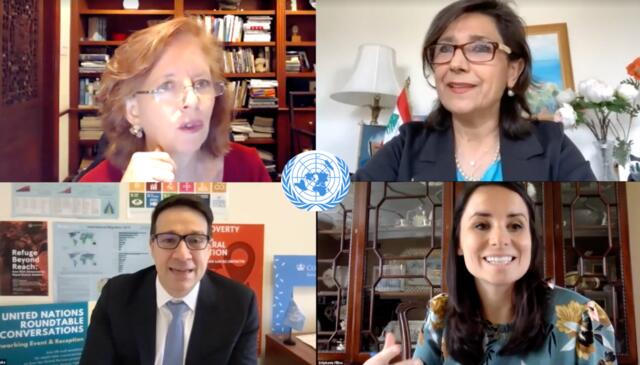
Distance Diplomacy: How the Pandemic affects Formal and Informal Processes at the UN
The COVID-19 pandemic changed the lives of millions of people in the world, forcing businesses, governments, and international organizations to shift to remote platforms. A high-level panel at Columbia SIPA shed light on how the United Nations continued its work in the new reality and how it changed the way diplomats negotiate.
Speaking at the April 6 event, Dean Merit E. Janow of SIPA highlighted the need to understand the repercussions of the pandemic for processes at the United Nations because of the importance of a global interconnected world and its impacts on policies on health, economic development, humanitarian affairs, human rights, peace or security.
Janow also thanked the panelists for sharing their thoughts on the benefits of interconnection and technology during the pandemic. “The U.N. has focused a lot in recent years on technology as an enabler to deal with problems,” she said. “This pandemic is a laboratory we would not have chosen, but that creates opportunities that I hope we can learn from you as to how you're thinking about it and both carrying on your mission.”
When the pandemic started, Lebanon’s permanent representative to the United Nations, Ambassador Amal Mudallali, served on the UN General Assembly’s first committee that deals with disarmament and international security and since the beginning of 2021, she has chaired the committee. She currently serves as vice president to the UNGA.
The decrease in cost and effort to organize virtual events led to an explosion of meetings at the UN, which poses challenges for small states with fewer staff. Another new challenge posed the UN’s multilingualism. In the virtual meeting platforms, interpretation was not available; Mudallali said that the loss of translation affected many meetings and many diplomats who were less comfortable negotiating in English.
Mudallali also highlighted the impacts of the personal living conditions. As is the case for many workers during the pandemic, diplomats were connecting from their homes that provided only small spaces and she remembered several virtual meetings during which children were crying in the background.
“But the most important effect of the pandemic was on negotiations,” Mudallali said. “Virtual negotiations came out to be a nightmare” because of the nature of negotiations. Some of the challenges include not having physical access to the chair and to other diplomates, having to rely in some cases on connecting via text messages—which can easily be ignored—and not being able to read expressions, energy, and body language that are lost on the screen.
Working under these new modalities is hard enough when collaborating with peers one has known well before the pandemic. But building relationships, trust, and cooperation with new ambassadors who have joined the UN in the last year proved to be even more challenging. And the lack of chance encounters, running into one another in corridors, at the delegates’ lounge, and elsewhere has significantly affected the relations between country representatives.
Voting procedures at the UN were also impacted, with important consequences. Because several countries opposed voting online, the General Assembly adopted what it called a “silent procedure” for all decision making, according to which a decision was adopted if no country raises an objection within a certain period of time. The flip side was that, as Mudallali recounted, “the silence procedure gave a veto power to every single country of the 192 countries and the United Nations.”
Another participant, award-winning reporter (and Columbia Journalism alumna) Stéphanie Fillion, discussed challenges and opportunities of shifting high-level discussions to online format at the UN and the future of multilateral diplomacy. She highlighted challenges faced by journalists reporting UN news to the world, as they sometimes inadvertently are left out from important conversations as the UN adapts to the new working environment.
Having researched the efforts of different countries to engage in digital diplomacy, Fillion said she found the changes at the UN to be transformative with respect to diplomacy. Considering 200 prerecorded video speech speeches at the UN General Assembly in September 2020, she said a few videos stood out: One, in which King Willem-Alexander of the Netherlands invited a youth leader to speak on the Philippines, integrated multimedia content. More recently, U.S. Vice President Kamala Harris gave a speech that was historical for many reasons—her prerecorded video message to the Commission of the Status of Women showed the high-level engagement these new forms of interactions attract.
Professor Daniel Naujoks, interim director of SIPA’s International Organization and UN Studies specialization, who moderated the event, said that digital meetings allow civil society organizations around the world to attend important discussions. He said the UN has become more approachable through the virtual platform, which could have a lasting impact on decision-making and negotiation processes. Naujoks reiterated that the pandemic and social distancing have shaped diplomatic interactions at the personal, institutional, and structural level, which illustrates both the weaknesses and limitations of the current system but also new ways to overcome them.
— Vato Gogsadze MPA ’21
Distance Diplomacy
April 6, 2021
Watch the event recording here.
